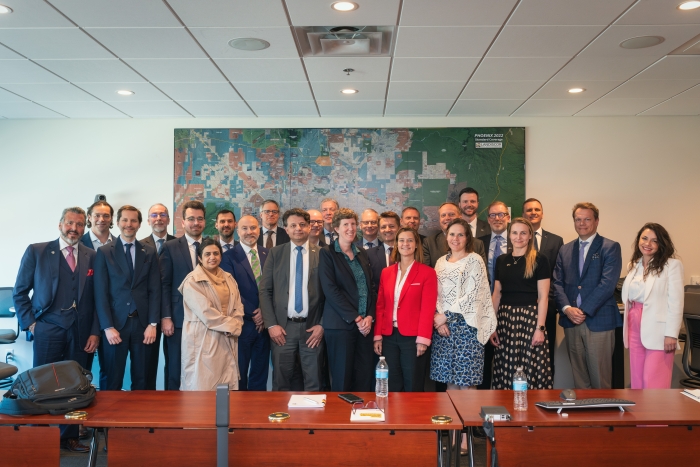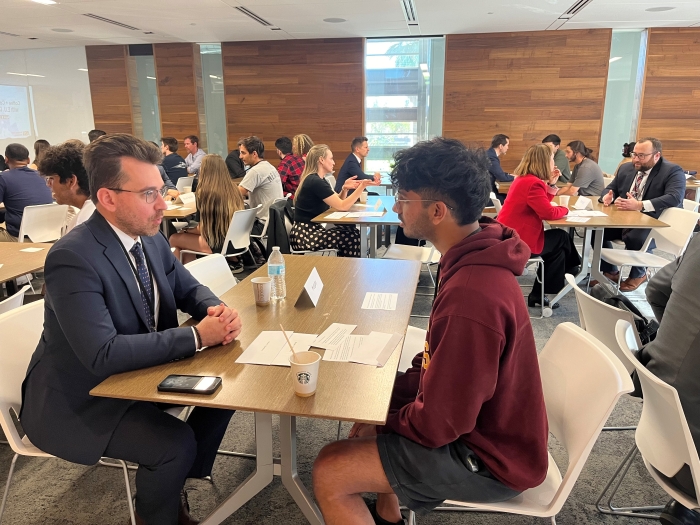EU delegation visits ASU with an eye toward collaboration on semiconductors

Approximately two dozen European Union representatives visited ASU this week to learn about ASU's role in the semiconductor space and meet with students about EU politics. Photo by Sarah Shoer/ASU
Arizona State University has attracted nationwide attention for its innovation related to the CHIPS and Science Act of 2022. Now the world at large is taking notice.
On April 9, approximately two dozen European Union representatives toured the university’s Global Futures Lab and spoke with President Michael Crow and others about ASU and the Phoenix metro area’s involvement in realizing and maximizing the potential of the U.S. CHIPS Act.
“We were really privileged to host the European Union delegation today as it speaks to ASU’s role as a global hub for semiconductors and our role as a sustainability leader in higher education,” said Ryan Shaw, managing director of strategic initiatives at Arizona State University and senior university advisor. “We’ve had a very productive time here and we’re anxious to continue our collaboration with them on our global impact in all those areas.”
The delegation was hosted by the Phoenix Committee on Foreign Relations. In addition to their time at ASU, their visit included stops at the Nogales Port of Entry, a roundtable meeting with experts in defense and critical minerals, a meeting with the Greater Phoenix Economic Council and a meeting with the Arizona Secretary of State Adrian Fontes.
“It means a lot for this high-level delegation to come to Arizona,” said Tina Waddington, executive director of the Phoenix Committee on Foreign Relations. “They could have gone anywhere in the United States, but because of the work that universities and private organizations like PCFR do, they chose Arizona. We have shown them amazing hospitality and have built a great program for them. This is something they wouldn’t be able to get in any other state because no other state does what we do.”
The European Union recently passed their own version of the CHIPS Act and visited Arizona to discuss potential collaboration between the two efforts.
“We have American companies who are invested in Europe, and we have some European companies who are invested in America,” said Michael Curtis, deputy chief of mission for the Delegation of the European Union to the U.S. “We see a need to work together and there’s a lot to be drawn from the cooperation between European countries, European companies, America and American companies. Hopefully, it’s a two-way street.”
Curtis said that the EU is a big investor and trading partner with Arizona and has created 70,000 jobs in the state. He also said Arizona companies export $3.5 billion worth of goods to EU countries annually, and the visit was also a way of promoting and spotlighting their partnership.
Alfred J. Molina, chairman of the Diplomatic Corps of Arizona, said the semiconductor industry put the state “in a fantastic position” and it’s their duty to help their European counterparts.
“Arizona is a wonderful place because we do things right,” said Molina, who is also the chairman of the Molina Group. “We also strive to go above and beyond when people need our help. That’s basically what we’re doing today.”
ASU officials gave the delegation insights into how Arizona became a prominent player in a global industry.
“When it comes to the future of semiconductor manufacturing and research in this country, there will be only a few locations in the United States that are globally relevant, and Arizona is surely one of those locations,” said Kyle Squires, dean of the Ira A. Fulton Schools of Engineering at ASU. “There are other locations in the country that are involved, though their efforts by comparison will be far less impactful.”
Squires said one of the reasons ASU is important to the semiconductor industry is because of the scale of the university and the learners that the Fulton Schools of Engineering will continue to produce.
“We are a large and comprehensive public university that is globally connected,” said Squires, who noted that in a few weeks, the Fulton Schools spring semester graduates will bring the total number for the year to over 7,300 graduates. “We have students from around the world who come here for our programs. And that talent is flowing into every key industry in the state and region — semiconductor companies and their suppliers, aerospace, defense, energy, health, you name it.”
Squires said the Phoenix metro area is “ground zero for semiconductors,” with a lineage that stretches back to Motorola sparking the region’s microelectronics boom when it opened a research and development facility in 1949.
Today, he said, Phoenix has a thriving and diverse ecosystem that is home to companies like Intel, Taiwan Semiconductor Manufacturing Company, Applied Materials, NXP, Microchip Technology, ON Semiconductor, ASM, Benchmark Electronics, EMD Electronics, DECA and Amkor Technology, among many others.
He said that in tandem with ASU’s four Phoenix campuses and the region’s research and development facilities, there is a growing presence of both the expertise and facilities needed to operate at a high level.
“Both degreed engineers and technicians are important to the future workforce,” Squires said. “Many of the current jobs will be positively impacted by automation and AI. That’s already happening and we want to not only produce future engineers prepared for that reality but also work with our industry partners ensure pathways exist to retrain technicians with the skills needed to keep up with technology. The need for higher education attainment is only going to increase.”
Squires said that future domestic semiconductor manufacturing will require growing the labor force from 190,000 employees in 2022 to 310,000 by 2032. That means universities will require new pedagogies, approaches and ideas for broadening access to knowledge, skills and training.
The university will continue producing the workforce at scale because of its unique charter, said ASU President Michael Crow.
“We’re not going to measure how good we are as a university by whom it excludes but whom it includes and how they succeed,” said Crow, who addressed the delegation in a half-hour meeting. “Do they graduate? Are they successful? Do they contribute to the success of the country or region? Universities need to carry some of that responsibility or we’re never going to find the solutions to the things we need to find solutions for.”
Following their meeting with Crow, the delegates were able to engage one-on-one with ASU students who hope to carry out the solutions they had discussed. Approximately 40 students — half of whom hailed from EU countries themselves — alongside a significant number of students enrolled in courses involving EU politics, sat with the visiting diplomats to ask questions about international relations, foreign policy and future collaboration.
Chase Baugh, who is studying urban planning and is a member of the Model United Nations at ASU, saw it as a once-in-a-lifetime opportunity.
“It was a great experience because it broke me out of a more traditional point of view regarding international collaboration,” said Baugh, who spoke to delegates from Croatia, Lithuania and the Czech Republic. “To get to talk to these folks and hear different perspectives was important for me and my learning development.”
Political science major Amanda Sheardown wanted to know from the delegates’ perspective how they viewed their relationship with the United States.
“They told me that’s it’s good, we’re progressing and we all think alike,” said Sheardown, who spoke to delegates from Estonia, Spain and Belgium. “We all play on the same team, and they see it going even further.”
For Sophie Karlshausen, deputy chief of mission to Belgium and head of the EU delegation, ASU saved the best part for last.
“It was a great opportunity and I wished it would have lasted longer because the discussions were very interesting to get their perspective on things.” Karlshausen said. “The questions they asked were very telling.
“We want to come back.”
More Local, national and global affairs

Arizona PBS is now free to stream for Prime Video viewers in the US
Arizona PBS is now available for streaming on Amazon Prime Video. A new partnership between PBS and Amazon brings the station’s primary, high-definition broadcast channel, along with the 24/7 PBS…

First-ever Taiwan Symposium at Thunderbird celebrates business, cultural connections
The investment by TSMC and other Taiwanese corporations in Arizona will reap dividends not only in thousands of new jobs but also in strengthened cultural connections and new methods of…

Study shows that trust drives successful market economies — but not in the way you may think
From fueling our cars to fulfilling daily coffee habits, the average U.S. cardholder makes 251 credit card transactions per year, according to Capital One.Each of these transactions are built…



